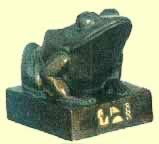Then people on /pol/ started noticing that posts referencing Trump were fielding an unusually high number of “gets.”
By this time some of the Trump supporters on /pol/ were learning chaos magic and putting it to work on behalf of their candidate. Memes putting Trump’s hair on Pepe the Frog, setting Trump and Pepe side by side as running mates, or involving Pepe in the Trump campaign in other ways, were blossoming all over the chans and spreading out into the internet. Loud kekking arose as pro-Trump posts fielded “get” after “get”—and then June 19, 2016 came around, and some anonymous user typed in “Trump will win” in response to a long string of irrelevant posts, and hit the enter button.
That turned out to be post number 77777777.
 It was somewhere around this same time, too, that someone on the chans noticed that “kek” wasn’t just a funny way of saying LOL. It was also the name of an ancient Egyptian god, a god of the primeval darkness that gave birth to the light, who was worshiped in the city of Hermopolis—and who was very often portrayed as an anthropomorphic frog. Like Pepe, in other words. Following up this clue, another anonymous user found on the internet the photo of an ancient Egyptian statue of a frog, mislabeled as a statue of Kek. It was actually a statue of the frog goddess Heqet, but no one realized that at first—and the hieroglyphics of the name Heqet look rather unnervingly like a person sitting in front of a computer screen, with a swirling shape like magical energies on the far side of the screen.
It was somewhere around this same time, too, that someone on the chans noticed that “kek” wasn’t just a funny way of saying LOL. It was also the name of an ancient Egyptian god, a god of the primeval darkness that gave birth to the light, who was worshiped in the city of Hermopolis—and who was very often portrayed as an anthropomorphic frog. Like Pepe, in other words. Following up this clue, another anonymous user found on the internet the photo of an ancient Egyptian statue of a frog, mislabeled as a statue of Kek. It was actually a statue of the frog goddess Heqet, but no one realized that at first—and the hieroglyphics of the name Heqet look rather unnervingly like a person sitting in front of a computer screen, with a swirling shape like magical energies on the far side of the screen.
Comments
funny new year meme
popular Christmas day quotes for Facebook